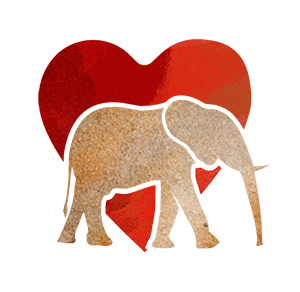Three weeks later we received a phone call from KWS that she had been found collapsed in a water hole too weak to stand, with stories of her young calf gallantly protecting her from the curious and hungry hyenas. Both were at risk of a gruesome end. We immediately prepared for the Sky Vet once again, this time headed by KWS veterinary officer Isaac Lekelol and our elephant Keepers accompanying him. The team headed to Amboseli, fully expecting that this may well have a tragic end, and that the calf may need rescuing before nightfall, as clearly with the hyenas aware of his presence and plight the chances were high that he would not be found in one piece the following day.
A KWS team met them at the airstrip and drove them to the water hole where Zombe lay completely devoid of any strength. The scene that the team was confronted with was so extremely sad. Zombe lay semi submerged in the mud of a waterhole, barely alive, and her confused little calf loyally still by her side trying as best he could to offer her the protection he knew she needed. How long she had been like that was never established, but clearly for some time. Any hope of retrieval was unrealistic, as Zombe’s health was now seriously failing and the reasons for her condition still unclear. With little option the decision was made by Dr. Lekelol to euthanize her and put her out of any further suffering and rescue her calf before he fell prey to the predators.
Her baby we know is two years old as his birth and first two years have been observed and filmed by the Amboseli Elephant Research team. He was a big and robust calf, typical of Amboseli elephants, and because of the stressful situation it was decided the best route would be to dart him, put him to sleep and for him to be transported by air to Nairobi, a short flight of 40 minutes. With the help of KWS and the Masai community, from the area where Zombie and her calf shared their last days, committed to helping the rescue team in lifting the immobilized calf onto the back of the KWS land cruiser and later with the heavy task of loading the calf onto the waiting aircraft this whole process was managed quickly before nightfall.
They arrived at the Nursery in the late evening, and the calf was woken once safely inside the stockade that would be home for the next five days. He seemed confused, but was immediately comforted by the surrounding orphans, and began to feed immediately on both milk from a bottle and greens. He tamed down incredibly fast, with an insatiable lust for his milk bottle. He seemed to relish company once more, but his haunted eyes carried the memory of his lost mother. We called him Ziwa. Ziwa means waterhole, and given that his old life ended at a waterhole and his new life began there it seemed fitting, also keeping the Z from his mother’s name.
Ziwa tamed fast and it was just five days before he was safely out with the others and heading to the midday mud bath time open to the public. Obviously with communication from the others he was fully briefed, because he was down there amazingly, around the visitors on his first day out of the stockades.
He is a lovely gentle elephant, who has found many new elephant friends in the Nursery. His condition is good and he simply loves his milk bottle, so Ziwa is a brave and lucky little elephant, afforded a second chance thanks to the hard efforts of many.















































